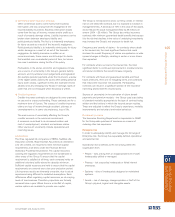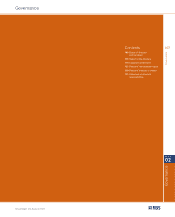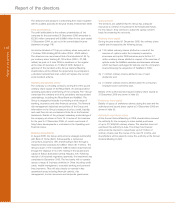RBS 2005 Annual Report Download - page 117
Download and view the complete annual report
Please find page 117 of the 2005 RBS annual report below. You can navigate through the pages in the report by either clicking on the pages listed below, or by using the keyword search tool below to find specific information within the annual report.
section
02
Governance
115
Corporate governance
Annual Report and Accounts 2005
The company is committed to high standards of corporate
governance, business integrity and professionalism in all its
activities.
Throughout the year ended 31 December 2005, the company
has complied with all of the provisions set out in the revised
Combined Code issued by the Financial Reporting Council in
July 2003 (the “Code”) except in relation to the authority
reserved to the Board to make the final determination of the
remuneration of the executive directors, which is explained
below in the paragraph headed ‘Remuneration Committee’.
The company has also complied with the Smith Guidance on
Audit Committees in all material respects.
Under the US Sarbanes-Oxley Act of 2002, enhanced standards
of corporate governance and business and financial disclosure
apply to companies, including the company, with securities
registered in the US. The Group complies with all currently
applicable sections of the Act.
Board of directors
The Board is the principal decision-making forum for the company.
It has overall responsibility for leading and controlling the company
and is accountable to shareholders for financial and operational
performance. The Board approves Group strategy and monitors
performance. The Board has adopted a formal schedule of
matters detailing key aspects of the company’s affairs reserved
to it for its decision. This schedule is reviewed annually.
The roles of the Chairman and Group Chief Executive are
distinct and separate, with a clear division of responsibilities.
The Chairman leads the Board and ensures the effective
engagement and contribution of all non-executive and executive
directors. The Group Chief Executive has responsibility for all
Group businesses and acts in accordance with the authority
delegated by the Board. Responsibility for the development of
policy and strategy and operational management is delegated to
the Group Chief Executive and other executive directors.
All directors participate in discussing strategy, performance
and the financial and risk management of the company.
Meetings of the Board are structured to allow open discussion.
The Board met nine times during 2005 and was supplied with
comprehensive papers in advance of each Board meeting
covering the Group’s principal business activities. Members of
the executive management attend and make regular
presentations at meetings of the Board.
Board balance and independence
The Board currently comprises the Chairman, four executive
directors and ten non-executive directors. The Board functions
effectively and efficiently, and is considered to be of an
appropriate size in view of the scale of the company and the
diversity of its businesses. The directors provide the Group with
the knowledge, mix of skills, experience and networks of
contacts required. The Board Committees contain directors
with a variety of relevant skills and experience so that no
undue reliance is placed on any individual.
The non-executive directors combine broad business and
commercial experience with independent and objective
judgement. The balance between non-executive and executive
directors enables the Board to provide clear and effective
leadership and maintain the highest standards of integrity
across the company’s business activities. The names and
biographies of all Board members are set out on page 109.
The composition of the Board is subject to continuing review
and the provisions of the Code will be taken into account in
respect of the balance of the Board. The Code requires the
Board to determine whether its non-executive members are
independent.
The Board comprises nine independent and five non-
independent directors (including executive directors), in
addition to the Chairman. Sir Tom McKillop is Chairman-
designate and Bob Scott has been nominated as the senior
independent director.
The Board considers that all non-executive directors are
independent for the purposes of the Code, with the exception
of Bud Koch who was formerly Chairman, President and Chief
Executive Officer of Charter One Financial, Inc. which was
acquired by Citizens Financial Group, Inc. in 2004.
Re-election of directors
At each Annual General Meeting, one third of the directors
retire and offer themselves for re-election and each director
must stand for re-election at least once every three years. Any
non-executive directors who have served for more than nine
years will also stand for annual re-election and the Board may
consider their independence at that time. The proposed re-
election of directors is subject to prior review by the Board.
The names of directors standing for re-election at the 2006
Annual General Meeting are contained on page 111 and further
information will be given in the Chairman’s letter to shareholders
in relation to the company’s Annual General Meeting.
Information, induction and professional development
All directors receive accurate, timely and clear information on
all relevant matters. Any requests for further information or
clarification are dealt with or co-ordinated by the Group
Secretary.
The Group Secretary is responsible for advising the Board,
through the Chairman, on all governance matters. All directors
have access to the advice and services of the Group
Secretary who is responsible to the Board for ensuring that
Board procedures are followed and that applicable rules and
regulations are complied with. In addition, all directors are
able, if necessary, to obtain independent professional advice
at the company’s expense.
Each new director receives a formal induction, including visits
to all the Group’s major businesses and meetings with senior
management. The induction is tailored to the director’s specific
requirements. Existing directors undertake such professional
development as they consider necessary in assisting them to
carry out their duties as directors.
Corporate governance
























